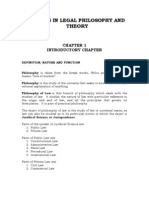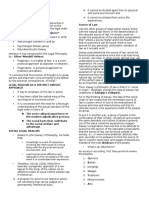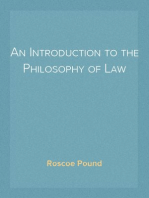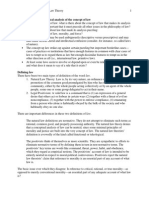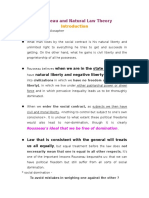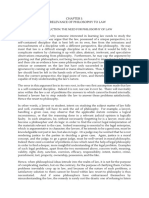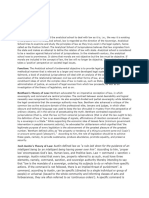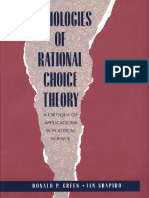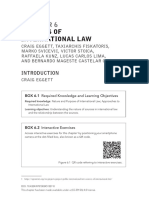Philosophy of Law Notes
Philosophy of Law Notes
Uploaded by
itsthechazCopyright:
Available Formats
Philosophy of Law Notes
Philosophy of Law Notes
Uploaded by
itsthechazOriginal Description:
Original Title
Copyright
Available Formats
Share this document
Did you find this document useful?
Is this content inappropriate?
Copyright:
Available Formats
Philosophy of Law Notes
Philosophy of Law Notes
Uploaded by
itsthechazCopyright:
Available Formats
Philosophy of Law 510
Thursday, January 17, 2013
2 parts of the course Race, justice, and rights Responsibility and punishment
Race, Rights, and Justice Features 3 Parts Interpreting constitutional rights Justice Companion volume to Responsibility and Punishment
Interpreting Constitutional Rights Scalia Bork Cardozo Hart Dworkin Constitutional coherentism
Foundations of International Law Kant Hart
Global Justice Rights Individual rights Collective rights Rawls Cosmopolitan liberal critique of Rawls In defense of Rawlsian global justice
Example of collective human rights: Humanitarian Intervention in Colombia Walzer on humanitarian intervention Rawls on the duty of assistance
Other Features Integrates the problem of racism into the entire discussion of justice and rights, while critical race theorists mostly eschew rights as harmful to all but those in power Employs a wide range of scholarship from philosophy of law to legal theory Uses mainstream analytical philosophy to argue for conclusions many of which are acceptable to critical race theory which most often rejects much of mainstream analytical jurisprudence.
Legal Theory Elements of a general theory of law. Explores NATURE of law: What is law? FUNCTION of law: to claim entitlement to confer rights on people (and things) Bootstrapping problem: How can duties and rights come about by the say-so of a person or an institution like the law? (Raz between authority and interpretation)
Types of Legal Theories Global: Applies to law regardless of region Local: Relativized to a particular legal context or region In either case, a legal theory identifies and explains the concepts involved in legal actions, and explains the nature of law given that legal actions have that character. (RAZ BAI, 2)
Epistemological Issues While it is true that a complete analysis of the nature of law is not likely, it is also not impossible Just because the concept of law is incomplete does not imply that it is not meaningful and useful.
Analysis of Law A) Setting forth conditions of a complete understanding of law, including its essential features B) Setting forth conditions for a minimal understanding of law, essential or nonessential, necessary but not sufficient C) Setting forth conditions for the minimal understanding of law Revised from Raz, Each set of conditions admits of degrees, implying that the understanding of law is a matter of degree.
Defining Law If a complete analysis of law is unlikely, and if it is not impossible, perhaps what we can hope for is an analysis of law that best describes most systems of law though perhaps not all of them, a kind of family resemblance idea of a legal system. Wittgenstein on family resemblance
What is Law? Austin: A law is part of a legal system iff it was enacted directly or indirectly by the sovereign of that system Kelsen: A law is a part of a legal system iff it is authorized by the basic norm of the system H.L.A. Hart: A law is part of a legal system iff it ought to be recognized according to the rule of recognition of the system. These are positivistic theories of law: Natural law theories will be covered shortly. Each view provides a very different idea of the nature of law and legal authority.
Harts Legal Theory (Concept of Law) Rule of recognition identifies primary rules of law and resolves conflicts between other rules under it. It says what counts as a valid law. Primary Rules: Rules identified by the rules of recognition. They are rules of conduct and say what you can and cannot do and what penalties will attach to this or that behavior. EX: 1st amendment right to free expression. Secondary Rules: Rules that explain how primary rules function in the system mof law. EX: Const rules conferring legis. Powers on congress No one rule can conflict with a superior one o OBJS: Non reason to think that there can be only one rule of recognition. And that it cannot be open to change (RAZ the authority of law).
Unity of a Legal System (RAZ) Material Unity: depends on the contents of its laws and how they are applied Formal Unity: Principles and structure of the system While most philosophers of law have concerned themselves only or mostly with formal unity, we shall concern ourselves with both formal and material unity.
Analytical Jurisprudence 3 main problem areas Judicial process and judicial reasoning (problem of interpretation of law) Legal concepts like rights, duties, responsibility, punishment, etc. How legal systems differ from and compare to other normative systems RAZ AL 103
Problem of Legal Identity Relation between the existence of law and its efficacy Distinction between making new law and applying an existing one Relation of law to the state RAZ AL 85
Chapter 1 What is Law? The product of many acts of law-making usually over long periods of time, not always enacted coherently and by various institutional bodies somewhat aware of one another, often pursuing divergent ends (RAZ 5) Lesson for law: Periodically check the law for ones that need to be repealed! This helps to keep the morally in tact
Problems of Legal Interpretation Law can vary from country to country Law can vary from period to period within a country Basics of law can vary from country to country Can a theory of interp. Span these diefferences RAZ BAI
Legal Pragmatism: An Excursion in Veriphobia Veriphobia: fear of the truth Post-modernists, pre-structuralists, deconstructionists, critical legal studies, critical race studies, and other anti-theorists (Fish; Posner) Denies possibility of objective truth, legal, or moral Law oppresses those under it as it coerces them to obey a set of rules assumed to be just or right or true Against theory because theory seeks to delude us into falsehoods masquerading as truths. Based on a language game metaphysic that subjectivizes all truth talk to mere expressions of feelings. o They say its true that there is no truth Thus law should be decided on the basis of what works for this or that party. Truth has nothing to do with correct legal decision-making.
You might also like
- Legal Philosophy NotesDocument43 pagesLegal Philosophy NotesJaveelyn Mataro87% (15)
- Philosophy of Law ReviewerDocument3 pagesPhilosophy of Law ReviewerMaria Reylan Garcia100% (12)
- HLA Hart The Concept of LawDocument6 pagesHLA Hart The Concept of LawCatalin Tudoriu80% (5)
- Philosophy of Law - CoquiaDocument33 pagesPhilosophy of Law - CoquiaEarlyBookwormHub86% (7)
- Legal Philosophy NotesDocument37 pagesLegal Philosophy Notespriam gabriel d salidaga100% (18)
- Introduction To LawDocument18 pagesIntroduction To LawMaxine SchultzeNo ratings yet
- TeleologicalDocument6 pagesTeleologicalLeiya Lansang100% (3)
- Legal Positivism vs. Natural Law TheoryDocument5 pagesLegal Positivism vs. Natural Law TheoryEki Moshi100% (2)
- Chapter 1 - Introduction To Public Administration-280214 - 093532Document30 pagesChapter 1 - Introduction To Public Administration-280214 - 093532Hafizul Helmy100% (1)
- Political Science 112C Fall 2011 UC Berkeley - Syllabus Readings Wendy BrownDocument3 pagesPolitical Science 112C Fall 2011 UC Berkeley - Syllabus Readings Wendy Brownhelloechoes100% (1)
- MODULE-5-CESC Com Action Olclass Social JusticeDocument3 pagesMODULE-5-CESC Com Action Olclass Social Justicekimberson alacyang100% (1)
- Philosophy of Law FinalsDocument5 pagesPhilosophy of Law FinalsJoseph Paolo SantosNo ratings yet
- LEGHIS-The Philosophy of The Civil Code SummaryDocument3 pagesLEGHIS-The Philosophy of The Civil Code SummarySuiNo ratings yet
- Utilitarianism, Economics and Legal TheoryDocument27 pagesUtilitarianism, Economics and Legal TheoryTammy LaiNo ratings yet
- Functional School of JurisprudenceDocument1 pageFunctional School of JurisprudenceJani MisterioNo ratings yet
- Philosophy of LawDocument5 pagesPhilosophy of LawlotuscasNo ratings yet
- Legal Philosophy Chapter 1 ReviewerDocument8 pagesLegal Philosophy Chapter 1 ReviewerNas Laarnie Nasam67% (3)
- LEGAL REALIST Outline - From ScribdDocument5 pagesLEGAL REALIST Outline - From ScribdDelsie Falculan100% (1)
- Natural Law Notes - 1Document3 pagesNatural Law Notes - 1yogen162No ratings yet
- Natural LawDocument10 pagesNatural Lawtweezy24100% (1)
- Philosophy of Law 1Document8 pagesPhilosophy of Law 1Peter MukhebiNo ratings yet
- Legal PositivismDocument10 pagesLegal PositivismKimberly Loide Timtim50% (2)
- Philosophy of Law NotesDocument7 pagesPhilosophy of Law NotesJS Sarmiento Jr.No ratings yet
- What Is The Philosophy of LawDocument11 pagesWhat Is The Philosophy of Lawsara batool syedNo ratings yet
- Natural LawDocument9 pagesNatural LawKhan ZeenatNo ratings yet
- Statcon MIDTERMDocument31 pagesStatcon MIDTERMLacesand solesNo ratings yet
- Memory Aid Philo of LawDocument5 pagesMemory Aid Philo of LawMichelangelo Tiu100% (6)
- Rousseau and Natural Law Theory - NelfiDocument6 pagesRousseau and Natural Law Theory - NelfiNelfi Amiera MizanNo ratings yet
- Dworkin's ConstructivismDocument6 pagesDworkin's ConstructivismJade MangueraNo ratings yet
- The Legal Dispute: Atty. Joseph L. BartolataDocument6 pagesThe Legal Dispute: Atty. Joseph L. BartolatajosephbartolataNo ratings yet
- Introduction To LawDocument50 pagesIntroduction To LawHarold B. Lacaba100% (6)
- Legal Philosophy NotesDocument10 pagesLegal Philosophy NotesDiannee RomanoNo ratings yet
- Sir Henry Maine: Historical JurisprudenceDocument18 pagesSir Henry Maine: Historical JurisprudenceSuraj SrivatsavNo ratings yet
- Brian Bix Natural Law Theory The Modern Tradition SummaryDocument5 pagesBrian Bix Natural Law Theory The Modern Tradition SummaryabhijitdholeNo ratings yet
- Chapter 5 Functional PerspectiveDocument57 pagesChapter 5 Functional PerspectiveMohammad Amr PangandamanNo ratings yet
- Consti Law 1 Sovereignty - AnswerDocument3 pagesConsti Law 1 Sovereignty - AnswerKristell FerrerNo ratings yet
- Statcon Cases MidtermsDocument9 pagesStatcon Cases MidtermsRealKD30No ratings yet
- Legal PhilosophyDocument14 pagesLegal PhilosophyERICKSKIE23No ratings yet
- Philosophy of Law 2017Document3 pagesPhilosophy of Law 2017Belle ConcepcionNo ratings yet
- Criminal Law Art. 21 - 88Document19 pagesCriminal Law Art. 21 - 88Ridz TingkahanNo ratings yet
- Constitution 1 Notes MidtermsDocument37 pagesConstitution 1 Notes MidtermsBrenda de la Gente100% (3)
- Philosophy ReviewerDocument3 pagesPhilosophy ReviewerAirelle AvilaNo ratings yet
- 3.classification of Civil LawDocument3 pages3.classification of Civil LawKashif Siddique100% (2)
- Legal TheoriesDocument4 pagesLegal TheoriesdrievNo ratings yet
- Jurisprudential Schools of Thought by Geoffrey SoreDocument17 pagesJurisprudential Schools of Thought by Geoffrey Soresore4jc100% (4)
- PHILOSOPHY OF LAW NotesDocument1 pagePHILOSOPHY OF LAW NotesJara AcoonNo ratings yet
- Module 1Document4 pagesModule 1Angelo Jher CabreraNo ratings yet
- Philosophy of Law NotesDocument15 pagesPhilosophy of Law NotesJeremiah Reynaldo100% (1)
- Poli Doctrines - 2019 Arcilla NotesDocument28 pagesPoli Doctrines - 2019 Arcilla NotesAyra ArcillaNo ratings yet
- Natural Law NotesDocument19 pagesNatural Law NotesAKMAL DINI BINTI ABU BAKARNo ratings yet
- American Legal RealismDocument2 pagesAmerican Legal RealismDhilip Nair AtchuthanNo ratings yet
- Consti 1Document184 pagesConsti 1kenNo ratings yet
- Chapter I - The Relevance of Philosophy To LawDocument35 pagesChapter I - The Relevance of Philosophy To LawCastillo Anunciacion IsabelNo ratings yet
- Tilted Justice: First Came the Flood, Then Came the Lawyers.From EverandTilted Justice: First Came the Flood, Then Came the Lawyers.Rating: 5 out of 5 stars5/5 (1)
- Philosophy of LawDocument15 pagesPhilosophy of LawMonique Ann FajardoNo ratings yet
- Hart and Indian ConstitutionDocument8 pagesHart and Indian ConstitutionVivek TripathiNo ratings yet
- Chapter 1 - Persistent QuestionsDocument5 pagesChapter 1 - Persistent QuestionsAshishNo ratings yet
- Cotterel - Law and The StateDocument9 pagesCotterel - Law and The StatePramod100% (1)
- Book Philosophy of Law 1 NotesDocument7 pagesBook Philosophy of Law 1 NotesLet Me SleepNo ratings yet
- Hla Hart TheoryDocument18 pagesHla Hart TheoryRachit Goel0% (2)
- Juris AnswersDocument12 pagesJuris Answersajit singhNo ratings yet
- 1 Legal Positivism and Natural Law-2Document10 pages1 Legal Positivism and Natural Law-2alkhanhridoyNo ratings yet
- I Should Probably Stop Wasting Time So I Cant Finish My Essay On TimeDocument1 pageI Should Probably Stop Wasting Time So I Cant Finish My Essay On TimeitsthechazNo ratings yet
- If You Contribute, You Have Access To Knowledge. It Is A Price A Price of Bartering, Not Quality, But Quantity - 1 4 1Document1 pageIf You Contribute, You Have Access To Knowledge. It Is A Price A Price of Bartering, Not Quality, But Quantity - 1 4 1itsthechazNo ratings yet
- Is It Possible To Swoop Da Whoop When The Poop From The Scoop Is Out of The Loop?Document1 pageIs It Possible To Swoop Da Whoop When The Poop From The Scoop Is Out of The Loop?itsthechazNo ratings yet
- Ancient Alien Theory Undermining Human Ingenuity Admits That God(s) Are AliensDocument1 pageAncient Alien Theory Undermining Human Ingenuity Admits That God(s) Are AliensitsthechazNo ratings yet
- Pens Mighter Then The SwordDocument1 pagePens Mighter Then The SworditsthechazNo ratings yet
- 2000 Black Templars Pro ListDocument2 pages2000 Black Templars Pro ListitsthechazNo ratings yet
- Guitar LogDocument1 pageGuitar LogitsthechazNo ratings yet
- LGC Case DigestDocument15 pagesLGC Case DigestCheyenne Arville RoldanNo ratings yet
- Basic Principles of Criminal LawDocument234 pagesBasic Principles of Criminal LawAllen SoNo ratings yet
- Network of Asia-Pacific Schools and Institutes of Public Administration and Governance (NAPSIPAG) Annual Conference 2005Document4 pagesNetwork of Asia-Pacific Schools and Institutes of Public Administration and Governance (NAPSIPAG) Annual Conference 2005Avanish K SinghNo ratings yet
- Bss 1Document11 pagesBss 1Al SukranNo ratings yet
- Philippine Politics and Governanceweek3 4Document6 pagesPhilippine Politics and Governanceweek3 4april LomocsoNo ratings yet
- Lecture 6 - E-Government & E-GovernanceDocument31 pagesLecture 6 - E-Government & E-GovernancePrincess Juan100% (1)
- Public International LawDocument11 pagesPublic International Lawsanya haiderNo ratings yet
- Liberal View of State: TH THDocument3 pagesLiberal View of State: TH THAchanger AcherNo ratings yet
- Right To Self DeterminationDocument2 pagesRight To Self DeterminationJay Vardhan SihagNo ratings yet
- Burma: United Nations Security Council (UNSC) Must Declare Burmese Junta's 2008 Constitution As NULL and VOIDDocument3 pagesBurma: United Nations Security Council (UNSC) Must Declare Burmese Junta's 2008 Constitution As NULL and VOIDBurma Democratic Concern (BDC)100% (2)
- Nature of The StateDocument5 pagesNature of The Stateapi-223744460No ratings yet
- Critically Discuss The Divine Theory of Origin of The StateDocument2 pagesCritically Discuss The Divine Theory of Origin of The StateTara AliNo ratings yet
- Course Guide HandbookDocument31 pagesCourse Guide HandbookU.A. Yousuf Hunaid HakimNo ratings yet
- Future of Democracy in PakistanDocument6 pagesFuture of Democracy in PakistanSikandar Hayat50% (4)
- The Administrative Law Training GuidelinesDocument258 pagesThe Administrative Law Training GuidelinesadrianghilasiNo ratings yet
- Constitution: 1. Essay On Position of President Before 42nd Amendment !Document4 pagesConstitution: 1. Essay On Position of President Before 42nd Amendment !NismaNo ratings yet
- Dynamic Learning Program Diss Gas 11 Week 1-8Document3 pagesDynamic Learning Program Diss Gas 11 Week 1-8Joyce Dela Rama JulianoNo ratings yet
- Feminist Theorizing in The International Relations DisciplineDocument10 pagesFeminist Theorizing in The International Relations DisciplineanantocrustNo ratings yet
- Human Rights Law Chapter 1 Nature of Human RightsDocument17 pagesHuman Rights Law Chapter 1 Nature of Human Rightscarla_cariaga_2100% (1)
- Aristotle's Classification of GovernmentDocument5 pagesAristotle's Classification of Governmentshreya mathane0% (1)
- Campita Drinie Heart Ayessa H GEC03 BSN1A FINALS ASSESSMENTS Cavite MutinyDocument7 pagesCampita Drinie Heart Ayessa H GEC03 BSN1A FINALS ASSESSMENTS Cavite MutinyKeesha Mae Urgelles TimogNo ratings yet
- Donald Green, Ian Shapiro - Pathologies of Rational Choice Theory A Critique of Applications in Political Science 1996 PDFDocument254 pagesDonald Green, Ian Shapiro - Pathologies of Rational Choice Theory A Critique of Applications in Political Science 1996 PDFGaluh Shafira Savitri100% (1)
- RealismDocument4 pagesRealismloserkid520No ratings yet
- World Justice Project 2016Document199 pagesWorld Justice Project 2016acastro2008No ratings yet
- What Is Power Sharing? Consociationalism, Centripetalism, and Hybrid Power SharingDocument23 pagesWhat Is Power Sharing? Consociationalism, Centripetalism, and Hybrid Power SharingRIDO GulmiNo ratings yet
- Sources of International LawDocument60 pagesSources of International Lawaspmarin7No ratings yet
- Johnson Et Al 2015 Political Science Research Methods (Capitulo 2)Document28 pagesJohnson Et Al 2015 Political Science Research Methods (Capitulo 2)RODRIGO EDUARDO BELMAR BRENNEISENNo ratings yet




